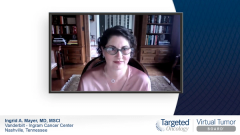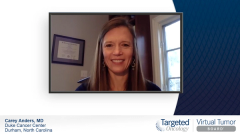
Case 1: Role of Anthracyclines in HER2+ Early Breast Cancer
Experts in breast cancer management discuss the use of anthracycline and risk of the cardiac toxicities.
Episodes in this series

Ingrid A. Mayer, MD, MSCI: I have abandoned anthracyclines for the most part. I haven’t done that since the BCIRG-006 study was presented. That was a study that came at the same time as the NSABP [National Surgical Adjuvant Breast and Bowel Project] trials. It was different from other trials because it had an arm that was anthracycline-free, that was the TCH [docetaxel, carboplatin, trastuzumab]. Nevertheless, with very long-term survival data follow-up, there’s barely any difference between anthracyclines or not. Even though in the TRAIN study, the anthracycline backbone was not directed—we shed it a long time ago, 5-FU [5-fluorouracil] 2 studies that confirm that the addition of anthracycline doesn’t add much, not just in terms of pathologic CR [complete response] immediately but even long-term survivability.
I find it hard to justify exposing patients to a small risk of increased cardiotoxicity and a risk of leukemia. But there’s 1 circumstance in which I will consider an anthracycline addition. The dose-dense AC-THP [doxorubicin, cyclophosphamide,paclitaxel, trastuzumab, pertuzumab] is a case in which we call a lot of things HER2+ [human epidermal growth factor receptor 2–positive], but we know that some things are more HER2+ than others. If a patient has an IHC [immunohistochemistry] 3 plus a FISH [fluorescence in situ hybridization] of 17, you know they’re going to be very dependent on HER2 blockage. But there are patients for whom that tumor is almost, for the most part, triple negative. Then only the FISH [fluorescence in situ hybridization] is positive, and you still have to treat S4-2, but there’s a big component of the heterogenous cancer that may not be reliant on HER2. That’s when I’ll favor a dose-dense AC-THP [doxorubicin, cyclophosphamide,paclitaxel, trastuzumab, pertuzumab] regimen, because I don’t think the HER2 blockade is the whole story when there’s a component of the cancer that’s so heterogenous that it will matter what chemotherapy you’ll add in there.
Sara Tolaney, MD, MPH:That’s a good point, Ingrid. Sometimes we’re a little nervous about this carboplatin-taxane backbone. It certainly is not a standard adjuvant type of regimen. Sometimes our group pulls out the Steve Jones trial, which looked at taxane with Cytoxan and not carboplatin and trastuzumab. That had predominantly stage II cases, although they had some stage III with excellent long-term outcomes. It was only 4 cycles of that TC [docetaxel, cyclophosphamide] with a different C [cyclophosphamide]. Sometimes, at least in those cases when they’re not strongly HER2+ or barely HER2+, I’m a little anxious that I’m not giving them an appropriate adjuvant regimen if they’re more triple negative. I fudge a little, and feel like I’m covering both ends by giving them TC [docetaxel, cyclophosphamide] with anti-HER2 therapy. They’re these funny cases, and sometimes we adapt that backbone. But it sounds like, as a group, there is a movement potentially away from anthracyclines in the HER2+ space, although I was a little surprised that the St. Gallen [International Breast Cancer Conference] consensus data, which just came out, asked what backbone would people use in a node-positive patient such as this. About 60% of people on the panel voted for anthracycline-based treatment.
Andrew Seidman, MD: Apart from the cardiac toxicity issue, look at TRYPHAENA. I don’t think many Americans use FEC [5-fluorouracil, epirubicin, cyclophosphamide] as their anthracycline component. We more likely use dose-dense AC [doxorubicin, cyclophosphamide]. But with FEC [5-fluorouracil, epirubicin, cyclophosphamide] followed by docetaxel, you compare the toxicities with TCHP [docetaxel, trastuzumab, pertuzumab, carboplatin] in TRYPHAENA. There are a lot of toxicities other than cardiac toxicity, where TCHP [docetaxel, trastuzumab, pertuzumab, carboplatin] was worse than FEC [5-fluorouracil, epirubicin, cyclophosphamide] followed by docetaxel. I’m talking about diarrhea. I’m talking about anemia, and anemia that requires transfusion. I’m talking about thrombocytopenia. I don’t know if any of you have had a patient who needs to go to the OR [operating room] after 6 cycles of TCHP [docetaxel, trastuzumab, pertuzumab, carboplatin] and needs a blood transfusion, or if you have to delay surgery to wait for her platelet count to recover. Sara is going to take us to CompassHER2-pCR, but for me an equally burning question about getting rid of anthracyclines is if can we get rid of carboplatin.
Ingrid A. Mayer, MD, MSCI:For the sake of this discussion, I’m not suggesting that people should do this at home. But I’m going to confess that…TCHP [docetaxel, trastuzumab, pertuzumab, carboplatin] is brutal from a tolerance point of view.
Sara Tolaney, MD, MPH: In terms of chemotherapy backbone, we have a little debate. There are certainly choices with nonanthracycline therapy. Most people are using TCHP [docetaxel, trastuzumab, pertuzumab, carboplatin] or considering anthracyclines in select cases.
Transcript edited for clarity.























